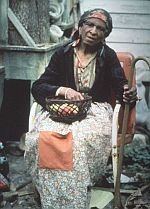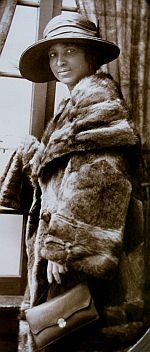From the Series "Black Women In Vermont History"

(HOST) Today, as we continue our series of stories about Black Women in Vermont History, we hear from folklorist and commentator Jane Beck, about master-storyteller Daisy Turner of Grafton, who was herself the child of former slaves.
(BECK) When I first met Daisy Turner in September of 1983, she was 100 years old, living by herself on the outskirts of Grafton, VT. She had high cheek bones and wide set eyes; her skin was still smooth, and I remember thinking she must have been a striking beauty in her youth. It was only upon reflection, that I realized how petite she was – little more than five feet tall. Somehow she seemed much larger due to her power with words.
 She was first and foremost a storyteller: her voice rose and fell, stories tumbling out one after another. One moment she was quiet, the next electric, performing, her arms pantomiming a reaction, her cane mimicking a task. The listener forgot her age, forgot the time and was mesmerized by the power of her voice and the scope of her story. Like a West African Griot, schooled by elders to serve as genealogist, historian, storyteller and singer for the community, Daisy fulfilled this role within her extended family.
She was first and foremost a storyteller: her voice rose and fell, stories tumbling out one after another. One moment she was quiet, the next electric, performing, her arms pantomiming a reaction, her cane mimicking a task. The listener forgot her age, forgot the time and was mesmerized by the power of her voice and the scope of her story. Like a West African Griot, schooled by elders to serve as genealogist, historian, storyteller and singer for the community, Daisy fulfilled this role within her extended family.
Daisy was the daughter of former slaves who settled in Grafton in 1873. Her family story is a multigenerational saga spanning two centuries, and played out on three continents. The story has been carefully preserved, anchoring the family in a distant past that details the English merchant trade in Africa, shipwreck, romance, the slave trade and capture, the obscurity of the middle passage, two generations of slavery, escape to freedom, determination to succeed and the eventual establishment of a family farm in Vermont, known as "Journey’s End."
 To her family narrative Daisy adds her own life stories, replete with discrimination, resilience, and strength of the African American experience in New England. At age 8, in a performance on the last day of school, she spontaneously celebrated her own identity by discarding the teacher’s verse and improvising instead on the black doll she was given to carry.
To her family narrative Daisy adds her own life stories, replete with discrimination, resilience, and strength of the African American experience in New England. At age 8, in a performance on the last day of school, she spontaneously celebrated her own identity by discarding the teacher’s verse and improvising instead on the black doll she was given to carry.
You needn’t crowd my dolly out,
Although she’s black as night;
And if she is at the foot of this show,
I think she’ll stand as good a chance,
As the dollies that are white…"
She won first prize.
As a young teenager, unbeknownst to her family, she took the train to Boston to confront a Mr. Barry in the Boston Market who had claimed that the poultry goods that the Turners had sent had spoiled. Not to be denied, she identified all the Turner poultry, as her father always clipped off the fowl’s back toe; she returned with full payment.
In 1927, she successfully won a settlement of $3750 in the East Cambridge Court House in Massachusetts when she sued Joseph Boinay, a white man, for promising to marry her, and breaking his contract.
Daisy’s narratives, steeped in emotion with a unique perspective, add greatly to our understanding of the African American experience, and enrich us all.